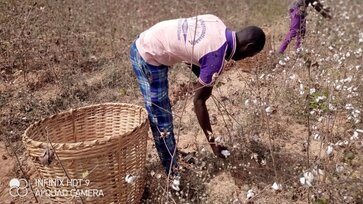Growing Benin’s organic cotton sector
Strengthening the organic cotton sector and sustainable cotton production in Benin.
Partners
- Pesticide Action Network (PAN) UK:
Since 1982 Pesticide Action Network (PAN) UK has been the only UK non-profit organisation exclusively dedicated to tackling harms caused by chemical pesticides and supporting the identification and adoption of agroecological alternatives. - Paul Reinhart AG:
Founded in 1788, the Swiss family business is the oldest and one of the world's leading cotton merchants. It has extensive experience in West Africa, including in Benin, and particular expertise in organic cotton and of buying cotton in countries with smallholder structures. - Aid by Trade Foundation (AbTF):
The foundation was established in 2005 by Prof. Dr. Michael Otto with the aim of helping small farmers in Africa to help themselves through trade and to improve their living and working conditions, as well as to promote the protection of our environment. With one of the world's leading standards for sustainable cotton, Cotton made in Africa (CmiA), the foundation implements its goals. The income from licences for CmiA-certified cotton is reinvested in the cotton-growing regions of sub-Saharan Africa, following the mechanisms of a social business. - Organisation Béninoise pour la Promotion de l'Agriculture Biologique (OBEPAB):
OBEPAB is a Beninese NGO founded in 1997 that provides training and technical support to cotton farmers on organic production methods, certification, and marketing. It promotes resilient and diverse smallholder farming systems and community initiatives that benefit women and men in the cotton growing areas of rural Benin.
Project description
Since November 2021, this project supports smallholder cotton farmers in Benin to convert to organic farming, which promises economic, social and environmental benefits. Overall, it aims to double the production of high-quality organic cotton in Benin, directly benefiting over 9000 smallholder farmers, at least 30% of whom will be women increasing their net income by 60%.
Planned measures include capacity building of the target group for sustainable farming methods. Seed trials and seed multiplication will ensure that high quality, locally adapted, organic cotton seed is available to all participating growers.
Indirectly, about 45,500 adults and children in farming households will benefit from the project through increased household income and reduced exposure to pesticides.
The project also contributes to strengthening the linkage of actors along the supply chain and thus to more transparency and continued high demand for Benin’s organic cotton. In this way, continuous investments will be sought to ensure the future of smallholder organic cotton production in Benin.

